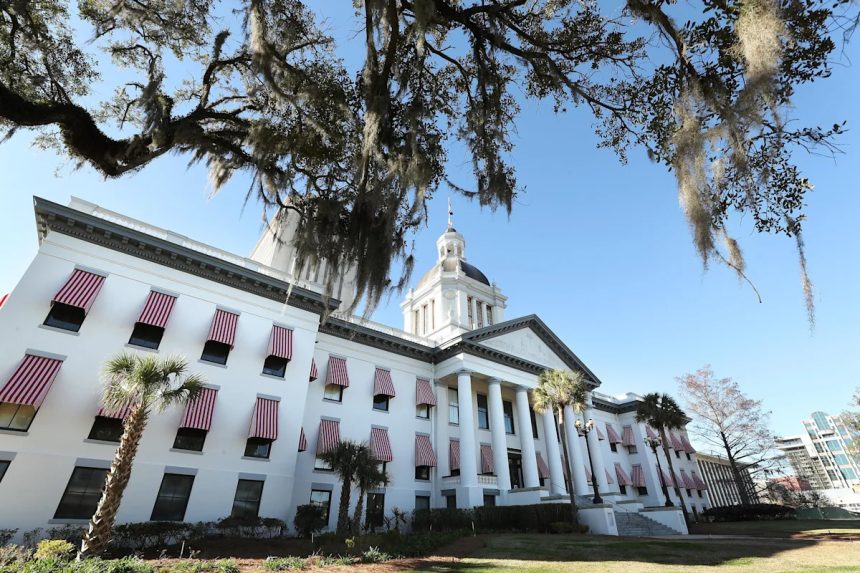Florida could be the next big target for Republicans to redraw their congressional lines to their advantage, with plans in the works to potentially target three to five House seats currently held by Democrats before the 2026 midterm elections.
The state already has a highly gerrymandered map that Florida Gov. Ron DeSantis pushed through in 2022, which led to a congressional delegation of 20 Republicans and eight Democrats.
A more aggressive gerrymander in Florida would launch another salvo in the political battle that has most recently seen GOP-controlled Texas and the Democratic-controlled California fight to enact new political maps. Currently, Democrats would need to win just three GOP seats in the House to claim control of the lower chamber.
President Trump, whose administration has pushed Texas to redistrict, has encouraged three other GOP-controlled states — Indiana, Missouri and Florida — to redraw their congressional lines.
“With California moving forward with their maps, there’ll be even more pressure to do that,” said one Florida GOP operative, who spoke anonymously to discuss conversations among state lawmakers. “I do think Washington’s going to look at Florida and be like, ‘All right guys, you gotta fix this.'”
In early August, Florida House Speaker Daniel Perez took a first step and announced the creation of a select committee on congressional redistricting. Perez said that was prompted by a July Florida Supreme Court decision that upheld the state’s current gerrymander and rejected a legal challenge over its elimination of a majority-Black district in North Florida.
Critics had said that the 2022 lines violated the state’s “Fair Districts” constitutional amendments passed in 2010 that were intended to prevent partisan and racial gerrymandering. Perez says the committee had to be created now, to examine in a timely way the intersection of the Fair Districts provisions with their redistricting efforts.
“[T]here are national conversations ongoing in other states related to midterm redistricting,” Perez said in the memo. “Exploring these questions now, at the mid-decade point, would potentially allow us to seek legal guidance from our Supreme Court without the uncertainty associated with deferring those questions until after the next decennial census and reapportionment.”
The select committee will hold its first meetings as early as the week of Oct. 6. The expectation among Florida lawmakers and GOP operatives in the state is that further debate and potential passage of a new congressional map would be added onto the docket for the Florida legislative session that begins in January 2026, though they say the situation is fluid and are waiting to see how the redistricting select committee operates.
There are at most five Democratic Florida U.S. representatives whose districts would be targeted during a potential redraw, according to two Florida GOP operatives familiar with discussions among lawmakers.
Democratic U.S. Reps. Debbie Wasserman Schultz, Lois Frankel, Jared Moskowitz and Frederica Wilson, as well as Rep. Darren Soto, in Orlando, could see their districts become more competitive by including more Republican-leaning areas, or be drawn into the same district to set up an intraparty primary.
Florida Sen. Shevrin Jones, a Democrat in South Florida, called the potential redraw “a straight-up power grab, politicians picking their voters, instead of voters picking their representatives.”
“The Republicans drew the damn maps, and now they want to come back and cut out Black Democrats and even Democrats who have worked across the aisle for their district,” Jones said.
Florida Atlantic University political science professor Kevin Wagner said there is substantial risk for the GOP in targeting Democratic seats and taking away reliably Republican voter bases away from strong GOP districts.
“It depends how much of a risk they wanna take. Because if you were in a +20 district towards your party, are you okay making it go +5 or +6? People get worried and they don’t want to be in a non-safe district. It’s a little more horse trading than people think,” Wagner said.
“The assumptions from redrawing the maps is that voters are going to vote in the same magnitude and pattern that has existed previously. Sometimes that turns out to be true and sometimes it does not,” he added.
Calling for mid-decade census
Florida Gov. Ron DeSantis supports a mid-decade redraw in his state, but he’s also taken it a step further. In recent weeks he has repeated Mr. Trump’s call for an early “redo” of the decennial Census count — in order to omit undocumented immigrants from the count — and claimed Florida’s population has increased enough to be allocated another congressional seat.
DeSantis claimed Florida’s population was undercounted by about 700,000 people — and Florida’s final population count just needed 100,000 to get an additional U.S. House seat.
The Census Bureau revealed in 2022 there had been an undercount of 3.48% (over 756,000) for Florida.
DeSantis said state Attorney General James Uthmeier will also make the argument to the Commerce Department, which oversees the Census Bureau, for a new mid-decade census. Uthmeier sent a letter in July to Commerce Secretary Howard Lutnick calling for “a corrected census to give Floridians the representation they deserve in Congress.”
“It’s not unusual that states complain that they’ve not got sufficient representation of their population. There are legitimate arguments about how we count, whether that is an accurate representation of the population,” Wagner said.
The Census Bureau has not announced any changes or plans for a corrected census to be completed by the 2026 midterm elections. The Constitution states the enumeration, or census count, will happen every ten years. One Census Bureau employee, given anonymity to discuss internal discussions, said it’d be logistically “impossible” to conduct a census and reallocate congressional seats in time for the 2026 midterms.
CBS News has contacted the Commerce Department for comment regarding any plans to change the census timeline. Thus far, there have been no official announcements to do so.
Generally, DeSantis does believe there is the political appetite in Tallahassee to redraw the state’s congressional lines.
“Even if they don’t do a new census, even if they don’t revise the current Census, I still think it is appropriate to [redraw the lines],” Desantis said during a press conference in Florida on August 11.
“I’ve spoken with some folks in the Florida Legislature, and I think that there’s broad acknowledgement that this is something that is going to happen,” he added.
Extreme weather slams the West with dust storms and wildfires
Video shows armed National Guard troops in Washington, D.C.
Judge tosses Justice Department lawsuit against Maryland’s federal judges over immigration order









